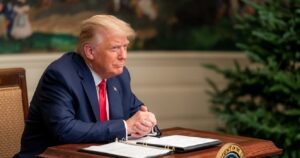Biden's Legal Victory Sets Stage For Future Presidential Appointments
This decision might pave the way for President-elect Donald Trump to exert similar control over Biden's appointees.
This ruling underscores the ongoing debate on presidential powers, impacting future administrations, the Daily Caller reported.
What's going on?
Back in 2021, former Trump administration officials Sean Spicer and Russell Vought challenged their removal from the U.S. Naval Academy’s Board of Visitors. Their lawsuit was aimed at preserving their positions and establishing a precedent that would strengthen presidential authority over such appointments.
However, U.S. District Court Judge Dabney Friedrich decided to dismiss the lawsuit. She confirmed that presidential appointees are not safeguarded against removal by subsequent presidents, marking a significant endorsement of executive power.
Responding to the ruling, Sean Spicer expressed that this outcome was intended to facilitate the removal of Biden’s presidential appointees by Trump, should he return to the presidency, emphasizing the broader implications for presidential governance.
Judicial Rulings and Senate Actions Impacting Governance
The judicial decision arrived at a time when Senate Democrats were busy securing several significant appointments. Among these was the appointment of David Huitema as the head of the Office of Government Ethics for a five-year term.
Furthermore, Biden recently appointed multiple new members to key boards and commissions. This includes four members to the Commission on Reform and Modernization of the Department of State, eight to the National Science Board, and one to the National Cancer Advisory Board.
These strategic appointments reflect an ongoing effort by the Biden administration to strengthen governance and oversight across various federal departments and agencies.
Political Reactions and Future Implications
The legal and political maneuvers occur amidst a backdrop of political tension, with American voters having re-elected Donald Trump on a platform focused on issues such as illegal immigration, foreign wars, and the economy.
Senate Republican leader Mitch McConnell, in contrast, has voiced his opposition to Trump's plans, particularly regarding foreign policy decisions like ending the war in Ukraine. In a recently published piece, McConnell declared his intent to obstruct Trump’s initiatives, emphasizing the deep divisions within party lines.
Senator Dick Durbin also commented on the issue of presidential appointments, specifically regarding FBI Director Christopher Wray. Durbin insisted that Trump could not replace Wray and that he should be allowed to complete his term, which is scheduled to end in 2027.
The legal precedents and Senate actions unfolding today are likely to significantly influence how future administrations operate, particularly in terms of appointing or removing officials who play key roles in national governance.
This ongoing narrative not only highlights the power struggles within the U.S. government but also sets the stage for future legal and political debates over the scope and limits of presidential powers.
As these developments continue to unfold, they will undoubtedly attract considerable attention from both the media and the public, keen to understand how these dynamics will shape the governance of the country.




